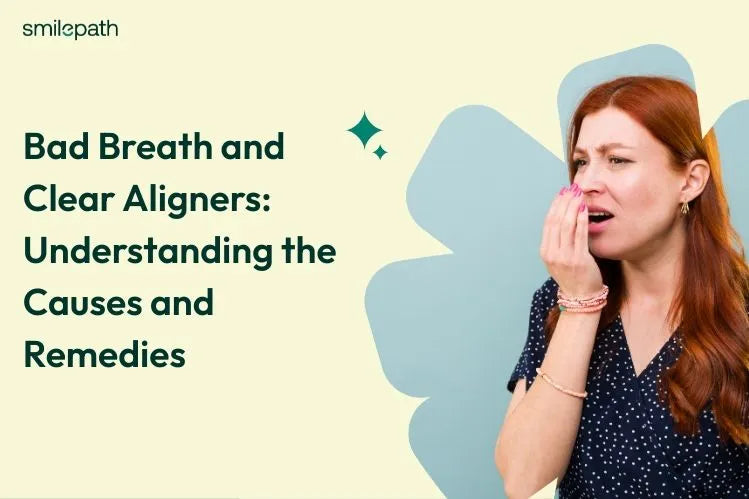
Table of contents
Causes of Bad Breath
Bad breath, also known as halitosis, is a common problem that affects people of all ages. It can be embarrassing and frustrating, especially when you are wearing clear aligners, such as SmilePath. Clear aligners are an excellent alternative to traditional braces as they are virtually invisible and can be removed for eating and brushing. However, wearing clear aligners can contribute to bad breath if proper oral hygiene is not maintained. In this blog, we will discuss the causes of bad breath and how to remedy it while wearing clear aligners.
Poor oral hygiene:When you wear clear aligners, it is essential to brush and floss your teeth regularly. Failing to do so can lead to a buildup of plaque and bacteria, which can cause bad breath.
Dry mouth: Wearing clear aligners can contribute to dry mouth as the aligners cover your teeth and prevent saliva from flowing freely. Saliva is essential in neutralizing acids and washing away food particles that can lead to bad breath.
Food and drink: Eating foods with strong odors, such as garlic and onions, or drinking coffee and alcohol can cause bad breath. When wearing clear aligners, these odors can become trapped, making bad breath more noticeable.
Gum disease: Gum disease is an infection of the gums that can cause bad breath. It occurs when plaque and tartar build upon the teeth and gums, leading to inflammation and infection.
Remedies for Bad Breath
Practice good oral hygiene: Brush your teeth at least twice a day and floss daily to remove food particles and plaque. Use an antibacterial mouthwash to kill bacteria and freshen breath.
Stay hydrated: Drink plenty of water to keep your mouth moist and promote saliva flow. This can help neutralize acids and wash away food particles that can cause bad breath.
Avoid certain foods and drinks: Avoid foods with strong odors, such as garlic and onions, and limit your intake of coffee and alcohol.
Visit your dentist: Regular dental checkups and cleanings can help prevent gum disease and other oral health issues that can contribute to bad breath.
Clean your aligners: Clean your clear aligners daily with a soft-bristled toothbrush and mild soap. This can help prevent bacteria buildup and keep your aligners fresh.
Use breath fresheners: Carry breath fresheners, such as sugar-free gum or mints, to use throughout the day when necessary.
Conclusion
Wearing clear aligners can be a great way to straighten your teeth discreetly. However, it is essential to maintain proper oral hygiene to prevent bad breath. By following the remedies outlined above, you can keep your breath fresh and your aligners clean. If you are experiencing persistent bad breath, despite good oral hygiene practices, it is essential to visit your dentist to rule out any underlying oral health issues.
FAQs
Wearing clear aligners alone does not cause bad breath. However, poor oral hygiene and dry mouth caused by wearing the aligners can contribute to bad breath.
The duration of bad breath after eating certain foods can vary depending on the individual and the type of food. However, strong odors from foods like garlic and onions can last for up to 72 hours. Drinking water and chewing sugar-free gum or mints can help alleviate the odor.


 Australia
Australia New Zealand
New Zealand Malaysia
Malaysia English
English Portuguese
Portuguese English
English English
English English
English English
English English
English Canada
Canada